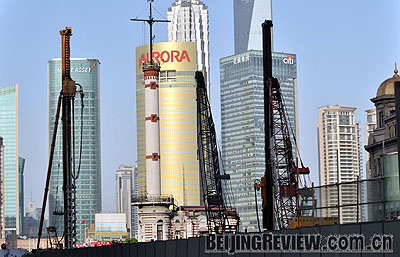|

MORE TOWERS: The government has vowed to give a boost to the sagging economy through a massive infrastructure investment project during the next two years
The global financial turmoil poses a big threat to all countries, and China is no exception. China's economic growth slowed significantly in the third quarter, arousing jitters about the financial crisis' toll on the real economy. Chinese Premier Wen Jiabao said at a meeting of the State Council on November 5 that China would adopt an "appropriately accommodative monetary policy" to replace the previous "prudent monetary policy" to boost the country's economy. The Economic Observer, a Beijing-based newspaper, interviewed Wu Xiaoling, a former central bank deputy governor and now lawmaker, about how the global financial crisis will affect China.
The Economic Observer: Compared with the 1997-98 Asian financial crisis, what is the scale of influence of this round of global financial turbulence?
Wu Xiaoling: My idea of the crisis has changed significantly during several rounds of investigations into various industries. In a July investigation, I was reassured that preventing inflation was the top priority and that GDP growth was not a problem at all. But since September this year, the U.S. subprime credit crunch has led to a global financial crisis, which consequently affected world economic development at large. Against this backdrop, I realized that maintaining the economic growth rate should be at the top of the agenda. Our basic economic situation this year might remain intact, but the Chinese economy will be confronted with daunting challenges in the next two to three years, and the situation might be even worse than the aftermath of the 1997-98 Asian financial crisis.
The problems at present are more nerve-racking than those in the 1997-98 financial crisis, which were easily defeated by expanding domestic demand and investing in infrastructure. During that period, consumption of autos and houses was not active at all. As a result, banks were encouraged to issue loans to auto and home buyers, which greatly stimulated domestic consumption.
However, the current problem is that the swelling bubble in the housing sector has greatly suppressed citizens' consumption capabilities. Auto consumption can no longer be considered a savior, because it is challenged by stricter environment protection protocols.
Our heavy reliance on exports, excess supply and inefficient consumption have made this year's economic predicament even more serious. We must be fully prepared for it.
What do you suggest in terms of fiscal policy adjustment? What should the government be prepared for?
I think the State Council's 10 measures on November 5 are a good policy adaptation. For one thing, it puts people's interests first. For instance, it vows to raise government grain purchase prices and to build affordable homes for the needy. On the other hand, it pledges to change the government's investment direction. The 10 measures send a strong signal that money can no longer be invested in high-pollution, high-energy consumption areas.
I have the following suggestions for fiscal investment: First, the government should invest more in rural infrastructure construction. We have too much to do to improve rural irrigation and water conservancy facilities, which are lagging behind the current productivity.
Second, we should invest more in urban public welfare undertakings. I suggest the government build no more expressways, because in the underdeveloped central and western parts of our country, the costly expressways have not been used efficiently so far. The government should invest more money to build urban infrastructure, especially underground pipe networks such as underground draining systems and sewage systems. We have built many new towns and extravagant aboveground architecture, but people hardly pay attention to the very fundamentals of a city.
| 